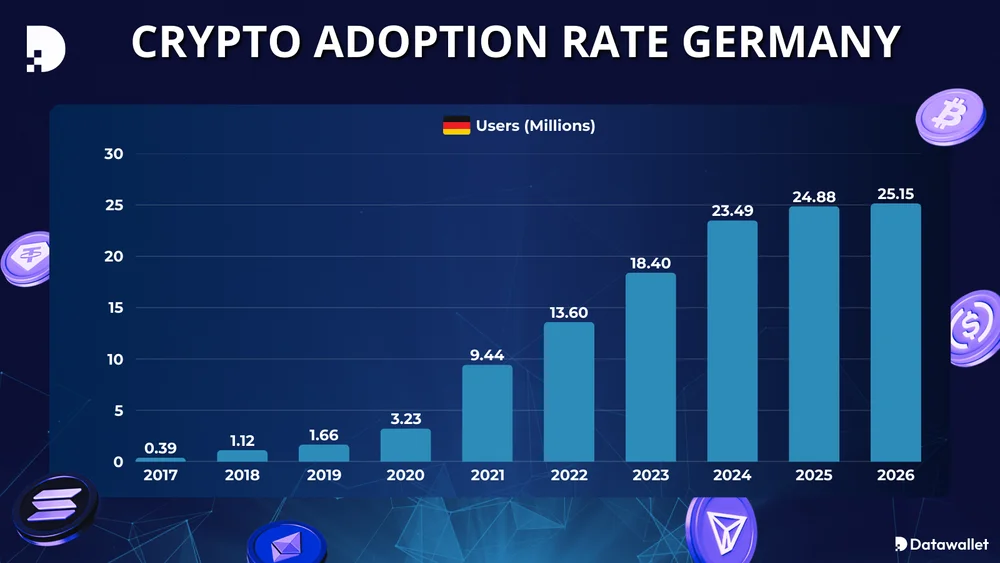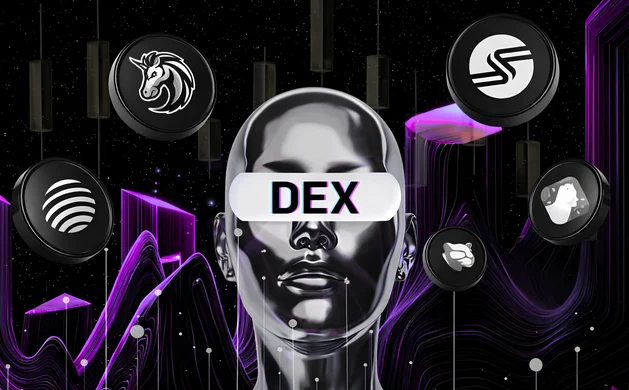6 Best Cryptocurrency Exchanges in Germany
.webp)
Summary: Germany has one of Europe’s most regulated crypto markets, with all exchanges required to comply with BaFin oversight and the EU’s Markets in Crypto-Assets Regulation (MiCA). Investors can deposit and withdraw in euros (EUR) through SEPA transfers, cards, and local methods like Sofort, while choosing a platform that fits their trading needs.
Here are the six best crypto exchanges in Germany for 2025:
Kraken is the best choice for German investors with BaFin-regulated custody, EEA licensing, low fees, broad products, and German language support.
Licenses
Crypto Asset Custodian License from BaFin (§ 64y Para. 1 KWG)
Available Assets
460+ Cryptocurrencies
EUR Deposit Methods
SEPA, SWIFT, PayPal, bank transfers, credit or debit cards
Top Crypto Trading Platforms in Germany
For German investors, the main factors when choosing a crypto exchange are security, fees, and compliance. The best platforms support Euro (EUR) deposits and withdrawals through SEPA transfers, with local options like Sofort and Giropay, plus cards and PayPal for flexibility. They keep trading costs low and operate under BaFin and EU MiCAR rules.
Exchanges should also provide a wide asset selection, proof-of-reserves, and dependable customer support. The table below compares five top cryptocurrency exchanges in Germany by fees, deposit methods, assets, and key features:
Exchange |
Cryptocurrencies |
Trading Fees |
EUR Deposit Methods |
Key Features |
|---|---|---|---|---|
| Kraken | 460+ |
0.16% Maker / 0.26% Taker |
SEPA, SWIFT, PayPal, Bank Transfer, Cards |
Futures, Margin Trading, Staking, Tokenized Stocks & ETFs |
| Bybit | 2,000+ |
0.1% |
SEPA, Cards, Apple Pay, Google Pay |
Derivatives, Liquidity, Copy Trading, AI Tools, Bybit Card |
| Bitpanda | 600+ Cryptos, 3,000+ Stocks & ETFs |
1.49% |
SEPA, Apple Pay, PayPal, Visa, Mastercard, Sofort |
Multi-Asset Trading, Indices, DeFi Wallet, Vision Token |
| OKX | 400+ |
0.08% Maker / 0.1% Taker |
SEPA, Cards, Apple Pay, Google Pay, P2P |
OKX Wallet, NFTs, DeFi Access, Trading Bots |
| BISON App | 30+ |
Spread ~1.25% |
SEPA, PayPal, Visa, Mastercard, Apple Pay |
Beginner-Friendly, Savings Plans, BaFin Regulated Custody |
| BloFin | 100+ |
Futures Maker 0.02% |
Cards, Apple Pay, Google Pay |
No KYC, Derivatives, Copy Trading, Privacy-Focused |
1. Kraken - Best Overall Exchange in Germany
Kraken is the leading crypto exchange for German investors, combining BaFin-regulated custody, EEA-wide licensing, and one of the broadest product offerings in the market. Founded in 2011, it now serves more than 15 million clients globally and offers full German language support, making it highly accessible for local users.
German traders can access a wide range of services, from spot markets to margin trading with up to 5x leverage and crypto futures. The Kraken Pro platform delivers advanced charting, real-time analytics, and customizable layouts, giving active traders institutional-grade tools.
Beyond trading, Kraken offers staking rewards up to 17% APR through its Auto Earn program and innovative products such as tokenized stock and ETF trading. Security is a core strength, with independent proof-of-reserves audits, cold storage for client funds, and 24/7 support.
Platform Highlights:
- Fees: 0.16% maker / 0.26% taker; zero-fee trading available with Kraken+ subscriptions
- Supported Assets: 460+ cryptocurrencies
- Regulation & Licensing: BaFin-regulated via DLT Custody GmbH (§64y KWG) and licensed as a CASP with the Central Bank of Ireland (CBI C468360) across EEA (including Germany)
- EUR Deposit Methods: SEPA, SWIFT, PayPal, bank transfers, credit and debit cards

2. Bybit - Top Choice for Liquidity on Altcoins
Bybit ranks as the second-best crypto exchange in Germany, recognized for its deep liquidity and derivatives offering. Founded in 2018, it now serves 74 million users worldwide, supports German language access, and records daily trading volumes exceeding US$30 billion, making it one of the most liquid venues for crypto assets.
The platform lists 2,000+ assets for spot trading and over 400 futures contracts, including perpetuals with leverage up to 200x. Advanced features include grid trading bots, copy trading, and TradeGPT, Bybit’s AI-driven analytics tool.
Outside of trading, Bybit Earn provides staking, lending, liquidity mining, and borrowing services, while the Bybit Card offers up to 10% cashback and no-fee crypto spending.
Platform Highlights:
- Fees: Spot trading from 0.1%
- Supported Assets: 2,000+ cryptocurrencies
- Regulation & Licensing: Operates as Bybit EU GmbH (FN 636180i), authorised under MiCA (Art. 63, Reg. (EU) 2023/1114) since May 2025 to provide custody, exchange, placement, and transfer services
- EUR Deposit Methods: SEPA transfers, credit/debit cards, Apple Pay, Google Pay

3. Bitpanda - Best Multi-Asset Platform in Germany
Bitpanda is one of Europe’s most established investment platforms, serving over 7 million users with access to 600+ cryptocurrencies and more than 3,000 digital assets, including stocks, ETFs, commodities, and precious metals. Known for its clean interface and strong reputation, Bitpanda combines crypto with traditional investing in a single platform.
For German users, Bitpanda offers Crypto Indices for automatic diversification, Bitpanda Spotlight for exposure to new projects, and ISO27001-certified security with offline fund storage. It also maintains one of the highest Trustpilot ratings among European exchanges.
The platform is expanding further into Web3 with its DeFi Wallet, Vision Token (VSN) with up to 10% APY and trading fee discounts, and plans for Vision Chain, a regulated Layer 2 for tokenised assets. With free EUR deposits via SEPA, Apple Pay, PayPal, Visa, and Mastercard, Bitpanda remains one of the most versatile options for German investors.
Platform Highlights:
- Fees: 1.49% trading fee
- Supported Assets: 600+ cryptocurrencies, 3,000+ stocks, ETFs, indices, metals, and commodities
- Regulation & Licensing: Authorised as a Crypto Asset Service Provider under MiCA with the Austrian FMA (FN 569240v) and German BaFin (ID 10159692)
- EUR Deposit Methods: Free deposits via SEPA, Apple Pay, PayPal, Visa, Mastercard, SOFORT, EPS

4. OKX - Best for DeFi and Web3 in Germany
OKX ranks fourth in Germany, attracting traders who want both advanced exchange tools and direct access to DeFi. On the centralized side, it offers spot, margin, perpetual futures, and options with low fees and strong liquidity. Active users can also automate strategies with trading bots covering grid, DCA, and arbitrage.
The key feature is the OKX Wallet, a self-custody gateway to over 130 blockchains. It lets users swap assets via DEXs, stake tokens, trade NFTs, and connect to DeFi protocols while holding their own keys. This makes OKX one of the strongest platforms bridging CeFi and Web3.
Institutions and high-volume traders benefit from an OTC network, portfolio margin, and advanced risk tools, positioning OKX as a versatile option for both retail and professional users.
Platform Highlights:
- Fees: Spot from 0.08% maker / 0.1% taker
- Supported Assets: 400+ cryptocurrencies
- Regulation & Licensing: Operates in the EU via OKCoin Europe Limited, licensed under MiCA by the Malta Financial Services Authority (MFSA) since Feb 2025, authorised for custody, exchange, trading, and portfolio management across the EEA
- EUR Deposit Methods: SEPA transfers, credit/debit cards, Apple Pay, Google Pay, P2P marketplace

5. BISON App - Local German Option
BISON, run by the Boerse Stuttgart Group, is Germany’s native crypto trading app with close to 1 million users. It is built for simplicity, offering beginners an easy interface, fee-free trading through spreads, and custody held 1:1 by Boerse Stuttgart Digital Custody GmbH, which is licensed under MiCA by BaFin and covered by insurance.
The app supports 30+ cryptocurrencies alongside features like staking with insured rewards, limit and stop orders, recurring savings plans, and price alerts. Its security framework includes ISO27001 certification and multi-level protection, ensuring assets remain safe under German regulation.
While BISON cannot match global exchanges for derivatives, DeFi access, or asset variety, it remains a solid choice for investors who prefer a straightforward, German-regulated platform backed by a long-standing financial institution.
Platform Highlights:
- Fees: No direct trading fees; spread ~1.25%
- Supported Assets: 30+ cryptocurrencies
- Regulation & Licensing: Custody provided by Boerse Stuttgart Digital Custody GmbH, licensed under MiCA by BaFin
- EUR Deposit Methods: Free SEPA transfers, PayPal (withdrawals after 7 days), Visa, Mastercard, Apple Pay, Google Pay

6. BloFin - Best No KYC Exchange
BloFin is the largest no-KYC crypto exchange, appealing to traders who prioritize privacy and speed. With around US$1 billion in daily trading volume, it offers deep liquidity across spot and derivatives markets. Onboarding is instant since no identity verification is required, setting it apart from licensed German platforms.
The exchange lists 100+ cryptocurrencies, supports perpetual futures with customizable leverage, and includes copy trading plus automated bots for grid and DCA strategies. Security includes multi-layer protection, proof-of-reserves, and partnerships with external custodians.
The trade-off is clear: BloFin delivers anonymity and liquidity but operates outside German and EU oversight, leaving users without BaFin or MiCA safeguards. It is best suited for experienced traders comfortable with offshore exchanges rather than those seeking regulated protection.
Platform Highlights:
- Fees: Futures maker fees from 0.02%
- Supported Assets: 100+ cryptocurrencies
- Regulation & Licensing: Offshore, not regulated in Germany or the EU
- Deposit Methods: Credit/debit cards, Apple Pay, Google Pay

Is Crypto Regulated in Germany?
Yes. Cryptocurrency is fully legal and regulated in Germany under a dual framework. At the EU level, the Markets in Crypto-Assets Regulation (MiCA) sets uniform rules for crypto-asset service providers (CASPs). Nationally, the Federal Financial Supervisory Authority (BaFin) is responsible for licensing, supervision, and enforcement.
Any exchange, custodian, or broker must comply with MiCA’s standards on investor protection, transparency, and anti-money laundering, and obtain BaFin authorization to operate legally.
Bitcoin and other cryptocurrencies are not legal tender but are classified as financial instruments or a unit of account. Germany first recognized this status in 2013, providing early legal clarity. With MiCA now in force, regulation is harmonized across the EU, making Germany one of the most transparent and structured crypto markets in Europe.
How is Crypto Taxed in Germany?
Cryptocurrencies in Germany are taxed as private assets under §23 EStG. Oversight lies with the Bundeszentralamt für Steuern (BZSt) and local Finanzämter, with guidance from the Federal Ministry of Finance (BMF). Tax treatment depends on the holding period, transaction type, and total income:
- One-year rule: Gains are tax-free if crypto is held for more than 12 months. Any sale or swap within a year is taxable.
- Short-term gains: Profits from disposals under 12 months are taxed at the progressive income tax rate (0–45%) plus solidarity surcharge. Since 2024, up to €1,000 per year in gains is exempt; above this threshold, the full amount becomes taxable.
- Other crypto income: Rewards from staking, lending, mining, or paid airdrops fall under §22 EStG as “other income.” Up to €256 per year is exempt; once exceeded, the full amount is taxed at your personal rate.
- Special cases: Margin and futures trades are treated as capital income and taxed at 25% (Abgeltungsteuer), without the benefit of the one-year rule or exemptions. NFTs and stablecoins follow the same rules as other tokens.
- Not taxable: Buying crypto with euros, moving coins between your own wallets, and gifts or donations within legal allowances.
Crypto gains and income must be declared in the annual income tax return via ELSTER (ESt 1 A with Anlage SO; Anlage KAP for derivatives). Transaction records must be kept for 10 years. The filing deadline for the 2025 tax year is July 31, 2026.
Tip: Holding for over a year and tracking all trades precisely are the most effective ways to reduce your tax burden.
Cryptocurrency Adoption in Germany
Germany is among the leading crypto markets in Europe, supported by regulatory clarity and growing demand. Market revenue is projected at US$2.5 billion in 2025, rising to US$2.9 billion by 2026 with a CAGR of 16.3%. User penetration will reach 29.2% in 2025 and surpass 30% in 2026, with more than 25 million users expected.
Institutional involvement is also accelerating. DWS, a Deutsche Bank subsidiary, is preparing a BaFin-regulated euro stablecoin for 2025, while Deutsche Bank plans to launch a crypto custody service in 2026 with Bitpanda and Taurus. Other major banks, such as Sparkassen-Finanzgruppe, are also moving into crypto trading.
Adoption is expanding at the consumer level as more German businesses accept digital payments, while policymakers explore integrating Bitcoin and tokenized deposits into the wider financial system.
Germany’s combination of regulatory certainty, institutional investment, and retail adoption underpins its position as one of Europe’s most advanced crypto markets.

How to Buy Bitcoin in Germany
The safest way to buy Bitcoin (BTC) in Germany is through exchanges regulated by BaFin and compliant with the EU’s MiCA framework.
- Select a Platform: Choose a licensed exchange that legally serves German users, such as Kraken, Bitpanda, or BISON App, all offering BTC/EUR pairs.
- Create Your Account: Register and complete KYC verification with a German ID card, passport, or driver’s license plus proof of residence.
- Deposit Euros: Fund your account using payment methods common in Germany. Options include SEPA and IBAN transfers, SOFORT, Giropay, PayPal, Apple Pay, Google Pay, and major credit or debit cards. SEPA is best for larger transfers, while cards and wallets provide faster funding.
- Buy Bitcoin (BTC): Go to the BTC/EUR market, enter your euro amount or Bitcoin quantity, and confirm the order.
After purchase, transfer your BTC to a personal wallet for security. Hardware wallets like Ledger or Trezor provide the strongest protection, while reliable software wallets offer a convenient option.
Final Thoughts
For most German investors, Kraken is a strong first choice thanks to its BaFin-regulated custody and wide product range.
Bybit is best if you value liquidity and advanced derivatives, while Bitpanda stands out for combining crypto with stocks and ETFs in one platform. Beginners who want a simple, regulated entry point can consider BISON, whereas OKX appeals to those exploring both trading and Web3.
Decide whether your focus is compliance, asset variety, or advanced tools, then choose the exchange that best fits your trading goals and risk profile.
Frequently asked questions
Can I link my German bank account directly to a crypto exchange?
Yes. Licensed exchanges in Germany support IBAN and SEPA transfers, making it possible to deposit and withdraw euros straight from a German bank account. This is the most common funding method for local investors, especially for larger amounts, as it combines lower fees with high reliability.
What is the minimum deposit to start trading crypto in Germany?
Deposit requirements differ by exchange, but most BaFin-compliant platforms in Germany let users start with as little as €10 - €20. Some exchanges set higher limits for bank transfers compared to card or PayPal deposits, so it's essential to check each platform’s funding policy before signing up.
Will German exchanges provide tax reports for my crypto trades?
Yes. Many exchanges licensed under BaFin generate annual tax statements or integrate with crypto tax software such as Blockpit or Koinly. These tools simplify reporting to the Bundeszentralamt für Steuern (BZSt), helping investors remain compliant with Germany’s strict tax requirements.
Do German crypto exchanges support staking and passive income options?
Several regulated platforms, including Kraken and Bitpanda, offer staking services where investors can earn yields on proof-of-stake tokens. The rewards vary by asset, and some providers also add lending or liquidity products, though these often come with different risk profiles.

Written by
Antony Bianco
Head of Research
Antony Bianco, co-founder of Datawallet, is a DeFi expert and active member of the Ethereum community who assist in zero-knowledge proof research for layer 2's. With a Master’s in Computer Science, he has made significant contributions to the crypto ecosystem, working with various DAOs on-chain.
.svg)
.webp)







